
Ismo Kullervo Alanko is a Finnish musician. He is known as the frontman of several bands, most famously Hassisen Kone, Sielun Veljet and Ismo Alanko Säätiö, as well as a successful solo artist.

Sielun Veljet was a Finnish rock band of the 1980s. They were formed soon after the disbanding of Hassisen Kone by its former frontman Ismo Alanko. Sielun Veljet never achieved the fame or the record sales figures of Hassisen Kone, but they became famous for their powerful stage presence and aggressive, shamanistic post-punk musical style. Most of the band's recorded material is sung in Finnish, except for their 1989 album Softwood Music Under Slow Pillars. They have also recorded English-language versions of their songs under the moniker L'amourder. In 2011, they released a new song, "Nukkuva hirviö".

Ismo Alanko Säätiö (Finnish pronunciation: [ˈismo ˈʔɑlɑŋko ˈsæːtiø]) was a Finnish rock group led by Ismo Alanko. The band featured an ever-changing lineup of musicians and can be considered an extension of Alanko's solo career. The band's name is Finnish for "Ismo Alanko Foundation".
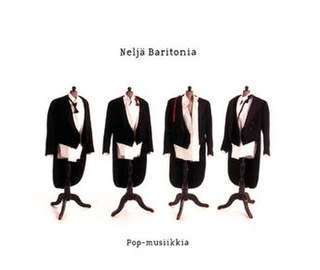
"Pop-musiikkia" is a single released in November 1997 by Finnish artists Neljä baritonia, a band consisting of Ismo Alanko, Kalle Ahola, Ilkka Alanko and A. W. Yrjänä. It is the only song the band recorded, and has been certified double platinum in Finland – currently the song ranks 61st on the list of the best-selling singles of all time in the country, with sales of over 17,000 copies. The song's music video was directed by Tommi Pietiläinen.
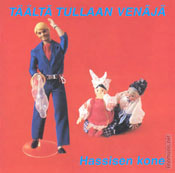
Täältä tullaan Venäjä is the debut album of Hassisen Kone. It was released in 1980, shortly after the newly formed band had won the Finnish Rock championship. The outspoken lyrics of the opening track "Rappiolla" shocked, among others, Yleisradio reporters Anneli Tempakka and Maija Dahlgren, who started protesting against indecency in rock lyrics. In response to this, the band humorously dedicated their 1981 Christmas song "On jouluyö, nyt laulaa saa" to the reporters. "Rappiolla" became one of Hassisen Kone's biggest hits.

Rumat sävelet is the second album of Finnish rock band Hassisen Kone. It was a successful follow-up to the group's debut Täältä tullaan Venäjä, and was certified platinum in 2005.
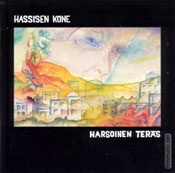
Harsoinen teräs is the third and final album of Hassisen Kone, released in 1982. Musically, the album has a progressive twist to it. The songs are more complicated than on the group's two previous albums, and the band's lineup was expanded to seven people for this album, featuring a new guitarist Jukka Orma, saxophonist Antti Seppo, keyboardist Safka Pekkonen and percussionist Hannu Porkka.

Sielun Veljet is the 1983 debut album of the band of the same name. "Huda huda", a Tuomari Nurmio cover, was later included on the band's tribute album Otteita Tuomari Nurmion laulukirjasta.

Hei soturit is the second studio album by the Finnish rock group Sielun Veljet. The CD release of the album is titled Hei soturit/Lapset, as it also includes the 1983 EP Lapset.

L'amourha is the third album of Sielun Veljet. It was their breakthrough album, gaining much of its success from the hit single "Peltirumpu". It is the only Sielun Veljet album to come close to the sales figures of Ismo Alanko's previous group, Hassisen Kone, and remains one of Alanko's most popular works. The album was named the fourth greatest Finnish rock album by Soundi magazine in 2005.

Shit-Hot is an album by L'amourder, a pseudonym for Sielun Veljet. It contains re-recorded versions of their songs translated into English.

Suomi-Finland is the sixth studio album of the Finnish rock band Sielun Veljet. It was released in 1988 between two English language albums, Shit-Hot and Softwood Music Under Slow Pillars. Suomi-Finland has a more acoustic sound than earlier Sielun Veljet material, anticipating the psychedelic, all-acoustic Softwood Music Under Slow Pillars.
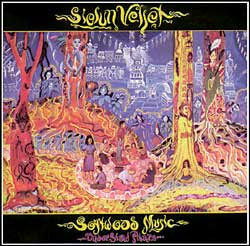
Softwood Music Under Slow Pillars is the seventh album of Sielun Veljet, released in 1989. It is the band's only English language album released as Sielun Veljet, although it was released in Sweden as L'amourder. The band had already released two English language recordings, the Ritual EP in 1986 and Shit-Hot in 1987, consisting of re-recorded versions of their songs with the lyrics translated to English, but this was the first time that the music was originally written in English.

Musta laatikko is a box set by Sielun Veljet, released in 1991. The first one of its three CDs contains material that was supposed to become a studio album before the band broke up. The second CD is for the most part unreleased live material, and the third disc is a live performance by Kullervo Kivi & Gehenna-yhtye at Vanha Ylioppilastalo in Helsinki, March 1990.

Otteita Tuomari Nurmion laulukirjasta is a tribute album by Sielun Veljet to Tuomari Nurmio, recorded in 1990 but only released in 2007. It is the only Sielun Veljet recording to top the Finnish album charts.
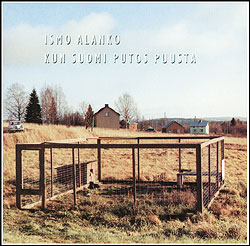
Kun Suomi putos puusta, also known as Kun Suomi putos puusta: ääniä vapaan pudotuksen aikakaudelta, and is Ismo Alanko's debut solo album. Released in 1990, it was originally commissioned for Helsingin Juhlaviikot, when Alanko was still a member of the band Sielun Veljet. The album's musical direction differed significantly from trademark Sielun Veljet material by exploiting a more acoustic and minimalist production style interspersed with foley-style atmospheric sound effects as typically used in film production. The album went on to sell over 30,000 copies in Finland and was certified gold in 1999.
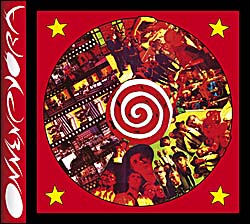
Onnenpyörä is a live cover album by Sielun Veljet under four different aliases, released in 1988.

Pulu is the 1998 debut album of Ismo Alanko Säätiö. The newly formed band's sound has influences from Finnish folk music. An important part of the album's sound is reputed accordionist Kimmo Pohjonen. Pulu reached number one on the Finnish album charts.

Luonnossa is the first live album of Ismo Alanko Säätiö, released in 1999. It contains songs from their debut album Pulu, as well as Ismo Alanko's earlier career with Hassisen Kone, Sielun Veljet and as a solo artist. The album was compiled of two concerts on the band's Tuulipuvun tuolla puolen tour, in Tampere and Joensuu. The Joensuu concert was also edited into a promotional video for the band.
Hassisen Kone was a Finnish rock band, founded in 1979 in Joensuu. The young musicians rose to popularity in 1980 after winning the Finnish rock championship in the new wave category. They recorded three highly successful albums before disbanding in 1982. The singer-songwriter Ismo Alanko has led several bands since then and continues to be an influential name in Finnish rock music.


















